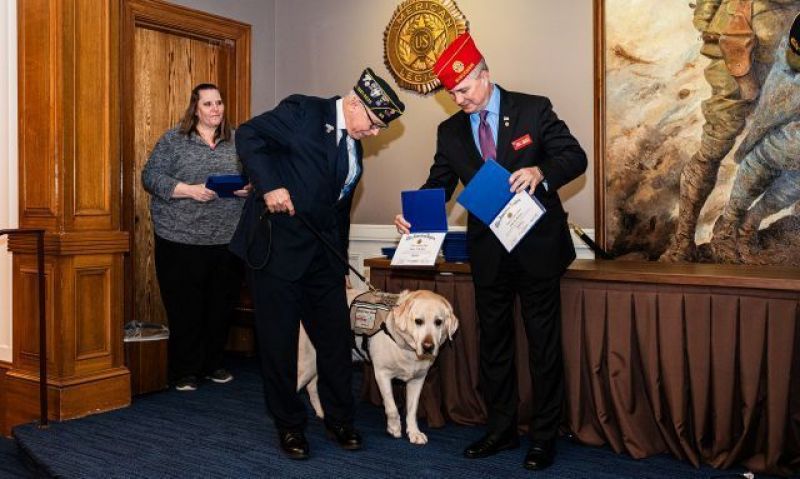
American Legion Past Department of Minnesota Commander Jennifer Havlick shares the do’s and don’ts with a service dog, veteran eligibility and more during the January Training Tuesday.
American Legion Past Department of Minnesota Commander Jennifer Havlick presented the Jan. 30 Training Tuesday session on service animals. Havlick spoke about her service dog, Dakota, and what she has learned with training, do’s and don’ts around a service dog, veteran eligibility and requirements to be a service dog.
Listen to the recorded training session.
Service dogs are trained for different tasks, such as assisting a blind or deaf person, or helping with PTSD. “When you get a service dog, you have to pick a task it can do and that’s the emphasis that you work on,” Havlick said. “Mine started with anxiety and PTSD, but I also know that I have neck and back injuries. We talked about in the future training him to pick things up off the floor so that if I can’t bend down, he could pick stuff up off the floor. You could basically, with enough time, train a service animal to do just about anything. I've seen them do some really awesome things.”
Havlick obtained Dakota through a private organization. While she had to have a referral letter from her therapist recommending a service dog and show proof of her DD214, a service-connected disability rating was not a requirement. The Department of Veterans Affairs does require a 50% or greater VA disability rating with a PTSD, MST or TBI diagnosis, Havlick said.
“If you’re going with a private organization, they didn’t require me to have a measurable disability with the VA.” But if you go through the VA for a service dog, Havlick recommends connecting with a veteran service officer, or contacting your local VA medical center, to know exactly what the requirements are and the documentation needed to receive a referral letter for a service dog.
A question Havlick often receives is where can a service dog not go. “If you have a certified service animal, they can go with you everywhere,” she said. Therefore, when you see a service animal, Havlick said do not: touch, feed, assume the dog is off duty or ask personal questions (ex. What is your disability?)
“Service dogs are never off duty unless the handler tells you they are,” Havlick said.
When you see a service dog and their handler, do:
· Give space, right away. “Give (the dog and handler) the right away when they’re in a large group. It's not as easy as you might think to navigate through a large crowd with a service dog, no matter how well train they are.”
· Respect the handler and dog. “Don't approach somebody with a service dog and get right up and close and personal with them because most dogs are trained to come between their handler and the public, just as a safeguard.”
· Focus on the handler, not the dog. “Lots of people like to come up and pet your dog, and Dakota was very people friendly. When we first started training, he had a bit of trouble with that because he wanted everybody to pet him. I let people pet Dakota, but only after they asked me so I was aware of who was coming toward Dakota because again, service animals are dogs and if they decide they don't like somebody because they get the wrong feel and somebody just walks up to them and starts touching them, you know, even the best dog might react badly. Really respect the working environment.”
“Just like any pet, your service animal loves you unconditionally, no matter what kind of mental state you’re in, no matter how much you yell or have a break down, they’re right there in your business reminding you that everything is going to be OK.”
- Homeless Veterans

